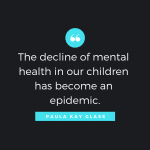“Spilling the tea” is teenage slang that this history teacher can appreciate. Like those 342 rebels that protested taxation without representation on December 16, 1773, in Boston harbor, it is time for educators (teachers and administrators) to become revolutionaries. Although the slang of the terms is typically about gossip, the “T” in tea is also a signal for speaking the truth. Nothing improves without noise. Education in America is in desperate need of a revolution.
[bctt tweet=”Education in America is in desperate need of a revolution.” username=””]
In education, teachers and administrators like to believe that their schools are filled with individual adults who are consistently doing their best to educate every child. Those of us (myself included) who work with other people’s children are a dedicated lot who grow quite defensive when criticized. Like homework in a middle schooler’s backpack, this defensiveness has created black holes where effective instruction and authentic learning disappear.
So, let me be the one to spill the tea. Our schools do have many individuals who work incredibly hard and are somewhat successful with many kids. There are also individuals in every school who are not effective educators (teachers and administrators). These people are part of a systemic problem who make the more effective educator’s jobs twice as hard. Many students graduate after thirteen years of education with significant gaps in their knowledge and skills. Teaching practices, materials, and poor leadership are all to blame.
I am crossing the thin chalkboard line to spill this tea. There are people in every school who are contributing to poor teaching practices, using misguided or canned materials, and subsequently failing students. There are administrators in many schools who are either too weak in their disciplinary practices or are too bent on rooting out black and brown kids and their perceived “ghetto behaviors.” There are many school leaders who refuse to tackle essential issues of instruction and school climate.
To call these individuals, “bad” is not an apt term. Bad connotes morality. No, these individuals are not morally bankrupt. “Bad” people make news headlines and get fired. I am talking about responsible adults who are contributing to limited student progress because these adults refuse to change.
The student deficits created by these teachers and administrators are often cumulative so that by the time students reach tenth grade they lack efficacy in basic skills. Intelligent students, without cognitive disabilities, lack basic communication skills, like how to construct logical sentences, let alone mastering topic sentences and evidence-based written statements or essays. Or these same students don’t own their math facts, making fluency impossible — mediocrity rules.
Why are schools not providing the best learning environments? What is the “T” in our truth?
- Public schools are the embodiment of Emma Lazarus’ poem on the Statue of Liberty–they accept all that enter. Not every student can master all of the mandated curricula. True.
- Public schools are microcosms of society and its ills. Mental health, school anxiety, student attendance, poverty, social media, bullying, addiction, parental instability are all factors that affect students’ level of achievement. True.
- Distractions are the norm. Instruction is hindered for announcements, phone calls, discipline, assemblies, special programs, etc. Add to that climate, students who are tired, students who are distracted by their phones, and students who talk incessantly results in instructional time on task dwindling even further. True.
- Administrators have an incredible job, which includes managing student discipline, the organization of the building, personnel issues, attending events, observing teachers, and overseeing the implementation of content. Administrators have too much on their plates to do everything well. True.
So, where do we go from here? What is this revolution?
- Pedagogy needs to be the top concern of every adult in the building. Discussion of best practices and instructional methods must be paramount. All professional development should be driven by science-based instructional practices and the reflection on those practices.
- External disruptions should be kept to emergencies or urgent matters.
- Teachers need to be empowered to remove students who are excessively talkative, distracted, or inappropriate. Furthermore, if pedagogy is a focus, then lessons would engage the majority of students, keeping negative behaviors to a minimum. Class time is sacrosanct.
- Administrators need to have difficult conversations with teachers who are not meeting the needs of their students. Struggling teachers need support and modeling.
- The teacher evaluation system is broken. Anyone can, once a year, show an administrator a wonderful lesson. Real instruction, however, is honestly analyzed by investigating materials, assessments, and methods routinely applied. Administrators and gurus often use the term data as the holy word for evidence. Administrators need to be held accountable for their appreciation of how teachers instruct. Administrators must collect data through informal and formal means.
- Educators are “Jacks of All Trades,” but they can no longer be masters of nothing. Elementary teachers (especially third through sixth-grade teachers) should be responsible for one or two subjects to hone their crafts. Elementary teachers deserve full preparatory periods every day. Yes, this means hiring more teachers.
- Recruiting more teachers means public schools need to pay teachers more. When compensating teachers, schools need funds. To fully fund schools, zip codes cannot determine the amount of money a district has to meet students’ needs.
- Middle school teachers need full support for removing disruptive students. Middle school can no longer be a place where pretty projects trump essential learning like writing instruction. Middle school should not be a time where grades don’t count, and kids need to survive the social turmoil.
- High school educators need to encourage many paths for students’ career choices. Vocational training, college credit-bearing classes, job shadowing and a variety of electives should be the norm. Many rural schools in America have limited opportunities, especially in electives and in advanced courses.
We have low expectations for our public schools, and they are performing accordingly. No one is denying that there are dedicated educators in every school. In order to keep those great people and recruit more, we must face our problems. Stop letting Harvard professors and business moguls dictate how our schools change. Educators know what schools need.
The wealthy and the powerful either don’t care about public schools or are rooting for their demise. Those of us who are in the public schools need to work to keep the positives and change the negatives of an institution that every citizen has a right to participate.
So, go ahead, spill that tea. Let’s be revolutionary.







Thanks, Laura. Let me be the second to spill some tea.
1. Very few teachers are purposefully ineffective and all teachers are sometimes ineffective. Same goes for administration, staff, parents, and students.
2. Teacher preparation programs are mediocre at best, negligent at worst. It is time to stop laughing that off or shrugging our shoulders. There is a movement to write to deans of education and calling them out on the lack of preparation we received to teach reading, writing, mathematics, management, and content via sound, evidence-based practices. Teacher preparation programs are where we can affect real change.
3. Teachers asking to be left alone, generating their own materials, and going by their gut are being selfish (looking in the mirror here). It creates a competitive culture where some students end up winners and other losers. Just because some superstar teachers may grow out of this system does not excuse all the experimentation done at students’ expense. If you’re ok with this then you better be ok with completely ineffectual teachers teaching your own children.
4. We must create a no-shame zone to safely admit what we don’t know. Our book club has become that space for some of us. We admit that going through school being asked to write and then, poof! — we are teachers assigning writing but not necessarily teaching writing. Those of us with more experience, and tenure, need to be brave, stand up and let people know how we struggle.
5. We need to learn how people learn — cognitive science — and stop chalking up academic struggles to character flaws. Cognitive science give us the tools to pinpoint what is getting in the way of learning and and cognitive psychology tells us how to make adjustments. It is unfair to label students, colleagues, and parents as uninterested loafs when they haven’t been presented information in the way that people learn.
6. Knowledge matters. Give them something to think about, talk about, write about. Not filling students’ days with fascinating information from history, literature, science, and mathematics anchors them to their own small worlds — worlds they already know creating the Matthew Effect where the rich get richer and the poor get poorer. Students who don’t receive knowledge in school must get it elsewhere, leaving it to families with means to fill in the gaps and students from families without fall further and further behind.
7. Don’t mistake fun with learning. Engagement can be quiet contemplation. While silence does not necessarily equal learning, neither does noise. Kids can be talking yet not learning. Let’s make sure they’re thinking, talking, writing, reading about the important things that will expand their world. “Students learn what they think about.” (Willingham). Give them lessons that make them think.
8. Assume good intentions and pick your fights. Educators, parents, and students — let’s let each other screw up from time to time. By all means address concerns but let’s start from a place that assumes good intentions and wait to blare sirens once a pattern of behavior is apparent. And when everyone is piling on, be brave to bring up a valid counterpoint to quiet the riot.
9. Everyone’s time and money are valuable and limited. We must honor them by regularly assessing the efficiency and efficacy of lessons, systems, procedures so we improve each year.
10. Students should not only be assessed, their opinions should be sought out. We should be asking for their feedback. Teachers should have a way to evaluate their superiors. Custodians, secretaries, food service, transportation should be asked how things are working from their perspectives. Parents should have a way to share their opinions. There should be exit interviews of staff. Technology makes this doable. So do it.
11. Education technology is the tail wagging the dog. Instead of presenting edtech to us, ask us what we need. What would do if it were easier, what we’d do if it were possible, what we’d do if there were more time. The fact that SchoolTool has not been made any more efficient and effective in all the years we’ve used it is an embarrassment to education. Ask us what takes too much time and search for solutions both grand and small. A tech department should serve educators not the other way around.
12. Administrators should ask staff to make 5 year plans. Where do we see ourselves? What else would we like to teach? Do? What training would we need? What experiences should we have? What books should we read? This would prevent last minute assignments we are unprepared for and up the level of professionalism by asking teachers to work towards goals.
I am speaking to myself here too — as a form of penance.
Who’s next to spill some tea?
Fantastic, Amy! Thank you. I especially love the idea of 5 year plans!